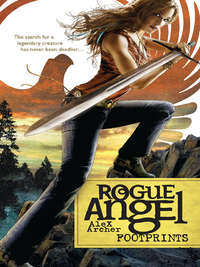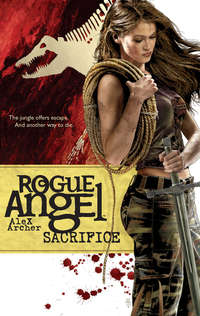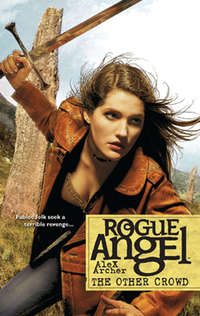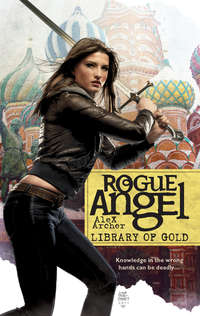
Полная версия
Secret Of The Slaves
“Digging up dirt on exploiters and polluters,” the young man said. “Also I might just be able to look out for you. I’ve been around some.”
Annja had to press her lips together at the thought of his looking out for her. “I’d certainly appreciate your having my back,” she said, truthfully if not so candidly.
He looked her up and down a little more deliberately than was strictly polite. “That I can do, Ms. Creed,” he said. “That I can do.”
4
“I said, Emo’s for people not optimistic enough to be Goth,” Dan said.
Annja laughed. On the long journey to Brazil from Publico’s Manhattan penthouse her companion had proved consistently entertaining, with a sharp eye and facile wit. Those traits didn’t exactly translate into being of perceptible use in fieldwork, but they did help to pass the time. And there was no doubt that his air of self-assurance, quite untainted by any hint of bragging over his own abilities or achievements, was an encouraging sign.
The Belém riverfront was splashed with noonday sun and alive with people as they strolled along it. It was hot, the humid air like a lead blanket that wrapped about her and weighed her down. The rain that had fallen as they ate a late breakfast at a café near their small but well-appointed hotel had done nothing to alleviate the heat. If anything the extra moisture in the air made it more oppressive.
The floppy straw hat Annja affected helped a little, but she still felt overdressed in sleeveless orange blouse and khaki cargo shorts. She had even forsaken her trusty walking shoes for a pair of flip-flops.
Her companion shook his frosted head. He wore a white polo-style shirt over khaki trousers, a surprisingly conventional upscale-tourist look. When she had called him on it at breakfast he had explained frankly that dressing like a more conventional college-age American, in jeans-and-T-shirt scruff, tended to attract a little too much attention from the local law enforcement.
“If there’s one thing I learned from Genoa,” he had said over a forkful of scrambled eggs and bacon—to Annja’s relief he was no vegetarian—“it’s to pick your battles with the Man carefully.”
Genoa, she had learned, was the antiglobalization protest where police had killed demonstrators, resulting in a scandal that rocked the whole European Union.
“I wish I had a better idea where this shop we’re looking for is,” he said, waving a scrap of paper holding the address of their first contact. “Unfortunately it’s not the sort of place you find in a clean and well-marked spot. Or even on Google Maps.”
Feeling surprisingly rested after what amounted to a protracted nap, Annja was noticing how different Belém looked and felt than Rio de Janeiro, that gaudy metropolis sprawling like a drunken giant along the Atlantic coast far to the south. Tourists didn’t come here as often as they did to Rio, or to São Paulo. It was hot as Dante’s imagination, a degree south of the equator, and hadn’t felt any cooler when they’d arrived at the hotel before sunup.
The esplanade where they walked was wide and bright and clean enough. But they were clearly in a poorer section of the city. Dan stopped and frowned dubiously down a narrow side street. “I’m sure it’s down one of these alleys,” he said. “But I’m afraid we could wander for days looking and not find it.”
“I can’t believe you’re acting like a stereotypical man,” Annja said. “Why not ask for directions?”
He raised both brows at her in an uncharacteristic and utterly amusing look of helplessness. “Because I can’t speak Portuguese?”
“Fair enough. But you know some Spanish, don’t you?”
“Enough to get by. But that’s a different language.”
She laughed. “So native Spanish speakers and Portuguese speakers are always trying to convince me. But if you just listen and try, you’ll find you can make out a whole lot more than you think. Trust me—I did when I first started trying to learn Portuguese after knowing Spanish.”
He set his chin in an expression she took for provisional acceptance. He seemed to cultivate a fashionable sort of perpetual three-day facial fuzz. She had to admit he wore the look well. Perhaps it was the underlying toughness he never alluded to in words, but was to Annja’s practiced eye unmistakable in the wary way he moved. He was always balanced and ready for action. It redeemed him from looking like some orthodontist’s kid from Seattle rebelling against capitalism and the modern world on a five-figure allowance.
Annja spoke to a pair of middle-aged women wearing white blouses and colorful skirts. They seemed surprised to find an American speaking to them in good Brazilian Portuguese, but were as friendly as most Brazilians Annja had encountered, and quickly told her how to find the address.
“Watch yourself,” the taller one suggested. “That’s not the best part of town for a white girl.” It was spoken matter-of-factly.
“I will,” Annja said in response to the warning. “Thanks.”
Annja led Dan away from the river down a relatively wide street.
“How many languages do you speak, anyway?” he asked.
“Several,” she said. “I’m pretty good with the major modern Romance languages. Spanish, of course. Portuguese, Italian, French, Catalan.”
He frowned. “Are you sure it’s a good idea for you to be here?”
She laughed. “One of those nice women warned me, too. But why you? I thought you were used to knocking around the Third World. Emphasis on knocking. ”
“Yeah, I am. And one thing I learned early on—sometimes it knocks back. There’s a lot of resentment at Western colonialism and cultural imperialism. It isn’t all just the wicked Muslims, the way the nutcases back home try to make it. And Brazil is kind of notorious for violence in its poorer areas.”
She noted with approval that he didn’t screw around with euphemisms. While she was no radical—she was pretty determinedly apolitical—Annja found herself more comfortable with the honestly hard core, as opposed to moderates, the mushy centrists, with their political correctness and nervous phrasing. She cared about words and what they meant. They were core to her professional discipline. She had little patience for people who muddied them with soft heads or hearts.
“Favelas,” she said. “Some of the Earth’s most serious slums. You’re thinking more of Rio de Janeiro. And yeah, that’s full-contact poverty. There really are favelas in Rio where the police literally don’t go except in battalion strength, the way they did in one of the worst districts just a couple of years ago.”
“I read about that online,” Dan said.
“I’ve been to Rio,” she said, “and this place has a different feel. For one thing, food’s a lot more readily available than it is in the middle of a huge urban wasteland.”
By chance they had come into a little market square, lined with kiosks offering everything from live chickens in crates to bin after bin of mostly unfamiliar fruits and vegetables to big wheels of cheese. And everywhere fish, of a remarkable range of size and shapes.
“Look around you. The people are mostly smiling, happy,” Annja said.
He shrugged. “Anesthetized to the realities of repression.”
“Dan, that’s not worthy of you,” she said more sharply than she’d intended. “You know nothing about these people.”
A man passed them with a cheerful nod and word of greeting.
“I stand corrected, Ms. Creed. “I confess I’ve been guilty of Western cultural imperialism and assumed superiority. Mea culpa, mea maxima culpa. ”
“You know some Latin,” she said. “That’s a great grounding for Romance languages. And just for the record, I like the wiseass Dan a lot better than the doctrinaire Dan.”
He might just as easily have told her off. They were, after all, contractors on assignment together. But he flashed a devil-may-care grin and said, “Noted. And maybe I do, too.”
They wandered down a line of stalls, listening to the good-natured—mostly—bargaining. Sometimes the African dialects were so prevalent Annja understood little if any better than Dan appeared to.
“Whoa. Those are some ugly fish,” Dan said, waving at a particularly formidable specimen, arrayed with armor and sinister spikes and barbs. “Didn’t I see one of these eating tourists in Mexico on an old episode of Outer Limits on Nickelodeon?”
“It’d have to be a bit bigger and a lot more ambitious than that one looks,” Annja said. “Of course, it is dead.”
“Remind me not to take a dip in the river. Not that it looks that inviting—it’s the color and consistency of pea soup.” He shook his head. “Man spoils everything he touches, doesn’t he?”
“Don’t kid yourself. The crust of old plastic bags and junk is largely man-made. But the river’s color and consistency are all natural, a combination of silt and things exuding into it from the forest all around,” Annja said.
“Huh,” he said, clearly unconvinced. She felt a flash of annoyance. He had a tendency not to see things that clashed with his preconceptions. She tried to let it go.
I have to work with him, she reminded herself. And anyway, for the most part he’s a lot more fun than a lot of partners I’ve had…. She let the thought dangle, unwilling to follow it further.
They pushed on, turning into a narrow street where two-story whitewashed buildings seemed to lean toward each other overhead. They took a right turn into a dank, muddy path that it might have been a compliment to call an alley.
Dan hung back, frowning at Annja. “Uh—” he said.
She stopped and looked sternly at him. “Don’t tell me you’re going all male-chauvinist protective on me.”
He shrugged. “It’s my job to look out for you, Ms. Creed.” She recognized he was in official mode.
“Hasn’t it occurred to you I’ve looked after myself in some pretty rough parts of the world?” And more than that, of course, but she wasn’t sharing that information. With any luck he’d never find out.
“Well—I don’t see a film crew anywhere,” he said. “Not to mention network security staff.”
“You’d be surprised how sparse that is for our show,” she said. “Anyway, look. If it makes you feel better, I happen to have long legs. I know you noticed.”
To his credit his gaze never wavered from hers. “Yeah.”
“So if anything bad happens I can run away real fast. Satisfied?”
He frowned at her a moment. Then his face unclouded and he laughed. “I get the feeling I have to be.”
They stopped at a blue-painted door set into a wall missing some chunks of stucco. He nodded. “After you.”
She pushed her way into darkness.
5
The first thing that hit her, along with the earth-burrow coolness, was the smell. It wasn’t an unpleasant smell, particularly. But it was a complicated one. A skein of smells, a tapestry, woven out of elements familiar, hauntingly reminiscent and outright strange. Some were organic, some chemical and astringent.
“May I help you?” a voice said from the shop’s dim depths.
A beaded curtain rustled. A woman emerged into the front room among close-packed shelves and counters. She was tall, possibly taller than Annja, although the red-and-yellow turban around her head added a few inches. In the gloom it was hard to be sure.
Annja glanced sideways at Dan. “We’d like to talk to the shop owner,” she said.
“That’s me,” the woman said. She seemed to glide forward without moving her feet, doubtless an illusion caused by her long skirts, which brushed the warped boards of the floor. “I am Mafalda. How may I help you?”
As she came close enough to distinguish detail, Annja realized that she was a very beautiful woman, seemingly no older than Annja, with mocha skin and eyes that might have been dark green.
“You’re Americans,” Mafalda said.
Annja smiled.
“What can I do for distinguished visitors from so far away?” Mafalda seemed to be slipping into a familiar role, which Annja guessed was half mystic, half huckster. She probably had one mix for the tourists and another for the locals.
Annja looked openly to Dan. Though never spoken, the arrangement seemed to be that while she was in charge of the scientific and research aspects of the expedition, he spoke for their mutual employer Moran. She wasn’t entirely comfortable with the arrangement, but Sir Iain was paying her very well.
“We understand you might have some information about a hidden city,” Dan said.
“Who told you that?” the proprietor asked. Shrewdly, Annja thought.
“Someone back in the United States,” Dan answered blandly.
Mafalda seemed unimpressed with that response. “Lost-city rumors crawl all over the Amazon like bugs,” she said, unwittingly echoing what Annja had told Sir Iain in his Manhattan headquarters. “They have done so ever since the days of the first explorers. I don’t deal in treasure maps. Perhaps you should seek elsewhere.”
Shooting an exasperated look at Dan, who only shrugged, Annja said, “Perhaps if you’d be so kind as to show us what you do deal in, please, we’d better understand how we might help each other.”
It occurred to Annja that their employer might be playing his cards too close to his well-muscled chest. Unless he simply had no better information to share. But he must have had some reason to send them here.
After favoring Annja with a quick, cool glance of appraisal, Mafalda smiled slightly. “Of course. If the lord and lady will follow me.”
“Lord and lady?” Dan echoed quietly.
Annja sniffled. He cocked his head at her.
“I’m allergic to something in here,” she said.
Mafalda, who had waited coolly for the whispered exchange to end—suggesting some experience with tourists—began her tour. “I serve the practitioner of candomblé. I have here everything needed for the toques, the rituals, whether public or private.”
“What’s candomblé? ” Dan asked as Mafalda led them through narrow aisles with bins of sheaved herbs, colorful feathers and beads.
“It’s a widespread folk religion in Brazil,” Annja said. “It’s basically a combination of Catholicism with West African beliefs.”
“Like voodoo?” Dan asked.
“That’s right,” Annja said, nodding. She dabbed surreptitiously at a droplet that had formed at the end of her nose and sniffled loudly again.
“We believe in a force called axe, ” Mafalda said, leading them into an aisle with a number of tiny effigies that reminded Annja of Mexican Day of the Dead figurines. There were also racks of odd, twisted dried roots and vegetables and sturdy cork-topped jars with not-quite-identifiable things floating in murky greenish fluids.
“Mind the jacaré, ” Mafalda said as an aside.
“Huh?” Dan said. “What’s jacaré? ”
He bumped his head on something hanging from the ceiling. He did a comical double take to find himself looking into the toothy grin of a four-foot stuffed reptile hung from the ceiling.
“One of those,” Annja said. She had found a travel pack of tissues in the large fanny pack she wore, and was in the process of blowing her nose. It made a handy cover for her grin. “An Amazon caiman. There’s a specific species named jacaré, but people around here mostly call all crocodilians that.”
Dan cocked a brow at Mafalda, who wasn’t bothering to hide her own toothy grin. “Decorating with endangered species?”
“We’re more endangered by the jacarés, ” their hostess said promptly. “They eat many Brazilians each year.”
“Is she serious?” Dan asked.
“Oh, yes,” Annja said.
He shrugged, shaking his head.
“You were telling us about axe, ” Annja prompted Mafalda. She had no idea if it had anything to do with their mission—to find some lead, however tenuous, to the mysterious hidden city named Promise—but she was fascinated, personally and professionally, with the local folk religion.
“Oh yes.” The turbaned head nodded. “ Axe is the life force. It permeates all things.”
“So your toques involve evoking this life force?” Annja asked.
The woman led them on toward the front of the cramped store. “Somewhat. Mostly we invoke the orixás. ”
The word was unfamiliar to Annja. “What are they?”
Mafalda flashed a quick smile. “Our gods,” she said, “Olorum is the supreme creator, but he doesn’t pay so much attention to us little people. So we don’t trouble him. The orixás, though, they’re the deities who deal with us humans. So they’re the ones we have to worry about keeping happy.”
“Makes sense,” Dan said.
The tall woman had led them back to the cash register, which was a modern digital model, Annja noted, Beside it stood racks of CDs with colorful covers. Dan picked one up and scrutinized it. “You have a sideline selling Brazilian jazz?” he asked. “These don’t look like New Age meditation CDs.”
“They are for the capoeira, ” Mafalda said.
“The martial art?” Annja asked.
Mafalda laughed. “It’s more than a martial art.”
“What do you mean?”
“Do you know the story of the slaves?” Mafalda asked. Annja felt Dan tense beside her. Her own quick inhalation turned into a sneeze, only half-staged.
“Some,” Annja said cautiously.
“Well, the slaves weren’t happy being slaves. So they practiced to rebel. But the masters would not permit this. So the slaves had to create a way of training that they could practice under the masters’ eye without their suspecting.”
“Hiding in plain sight,” Annja said.
Mafalda nodded, smiling. “Exactly. So they hid their warrior training as a type of dance used in religious rituals.”
“And so in turn capoeira practice got worked into the actual rituals?” Annja asked.
“Perhaps. Today capoeira is all these things—a form of fighting, a dance, candomblé ritual.”
“I see.” Annja skimmed the rack until a cover caught her eye. A very dark, very skinny man was performing a trademark capoeira headstand kick in front of a rank of colorfully dressed dancers shaking what appeared to be feather gourd rattles. “I’ll take this one, please.” It seemed a gracious thing to do, a way to keep open lines of communication with their uninformative informant. Also she was curious.
Mafalda rang up the transaction. She wrapped the CD in fuchsia paper and taped it neatly.
“Some of the slaves did fight back, you know,” she said as she handed the parcel to Annja. “They escaped and fled into the forest. There they fought. Some died, some won their freedom.”
“The Maroons,” Dan said.
“Yes,” Mafalda said. Her manner was suddenly very grave. “The ones about whom you asked—they do not like strangers seeking after them. Capoeira was not the only weapon they created unseen beneath the world’s nose. And their reach is very long.”
6
“Was it just me,” Dan said, sipping strong coffee the next morning at a green metal table at an open-air waterfront café near their hotel, “or did that woman seem scared to tell us about the Maroons?”
“It wasn’t just you,” Annja said. She took a sip of her own coffee. “But she seemed more scared not to.”
“So did we learn anything?” he asked.
“They have a long reach.”
Dan set down his cup, shaking his head. “This is all starting to sound way too Indiana Jones.”
She smiled. “What would you call a quest for a lost city?”
He laughed but shook his head again. “The real world doesn’t work like that.”
“Doesn’t it? I thought terrorizing people to get results was thoroughly modern. Doing it long-distance, even.”
“Touché,” Dan said without mirth. “It just struck me as far-fetched.”
It would have me, not so long ago, Annja thought but did not say.
The café stood near a set of docks servicing riverboats somewhat larger, if not markedly more reputable looking, than the small craft Annja and Dan had seen crowding the river the day before. Dockworkers were swaying cargo off a barge with an old and rickety-looking crane. The stevedores were big men, mostly exceedingly dark and well muscled.
Although it was relatively early in the day and they were both lightly dressed and sat in the shade of an awning, Annja could feel sweat trickling down her back.
“It’s not, really,” she said, sipping her coffee. “Farfetched, I mean. If you think about them just like any other…interest group or faction. A lot of governments go to extremes to protect their secrets.”
“Corporations, too.”
“Sure. Other groups, as well. These people’s ancestors fled to escape slavery and then persecution—attempts to recapture them, reenslave them. That could account for their being a little paranoid.”
“But didn’t Brazil abolish slavery—what? Over a hundred years ago,” Dan said.
“In 1880,” Annja said. “It may be,” she continued, setting the cup down and leaning forward over the table, “that Mafalda gave us more information than she intended.”
“What do you mean?”
“I thought a lot about what she told us last night. She was worried, basically, that the Maroons—the Promessans, we might as well call them—might think she talked too much about them.”
“So you’re thinking they’ve got some kind of surveillance on her,” Dan said. “Bugs? Or maybe something astral?” He said the last with a laugh.
“Hey, I’m as hardheaded skeptical about that stuff as you are.” Although I bet I have to work a whole lot harder at it, she thought. “I’m not even sure I go so far as buying electronic eavesdropping, although with snooping gear so incredibly cheap and tiny these days, I guess I shouldn’t dismiss it out of hand.”
“What are you thinking?” He was all business now. In a sense she was pleasantly surprised. While he had been polite and correct the whole time they had been together, she had picked up pretty unequivocal signals he found her attractive. But he also conveyed a certain sense of superciliousness. Not quite disdain. But as if he were the professional here, not she.
Given his background, and current mission brief, she could even understand that, however it irked her. If only he knew how wrong he was. And yet, of course, she couldn’t tell him that the last thing she needed was his protection.
Not that he’d believe her if she tried.
But now he was acting like one pro talking business with another, and that was good. “While it’s not even impossible they could bug Mafalda’s shop long-distance—I mean, all the way from Upper Amazonia—I don’t think that’s the likeliest thing. At least, it’s unlikely to be their only measure,” Annja said.
“Back up a step. You think they could bug the shop all the way from their hidden fortress?” Dan asked.
She shrugged. “Why not? It could be something as prosaic as a satellite phone relay.”
“So you’re not envisioning these people as, like, some kind of lost culture still living in the eighteenth century or whenever?”
“I think that’s King Solomon’s Mines,” she said with a smile. “Not necessarily. Were you? For that matter, is Sir Iain? I thought his whole thing was the possibility they might possess technology far in advance of ours.”
“Well—maybe. But they could possess, say, herbal techniques developed beyond the scope of modern medical science and still have an archaic culture. Or an essentially indigenous one.”
“Maybe. But from what Sir Iain told me, and some research I did afterward, one of the first things the escaped slaves did was start trading with the English and the Dutch for modern weapons.”
“I don’t mean to be racist, but that seems pretty sophisticated for slaves,” Dan said.
“I found out something pretty startling. Not all the slaves were preliterate tribal warriors from the bush. It turns out the Portuguese colonists were so lazy they got tired of administering their plantations and mines and other businesses themselves. So they started kidnapping and enslaving people from places like the ancient African city of Tombouctou. They may even have enslaved their own people from their colonial city of Luanda.”
“Meaning—”
“Meaning they were deliberately capturing and enslaving clerical and middle-management types,” Annja said.









